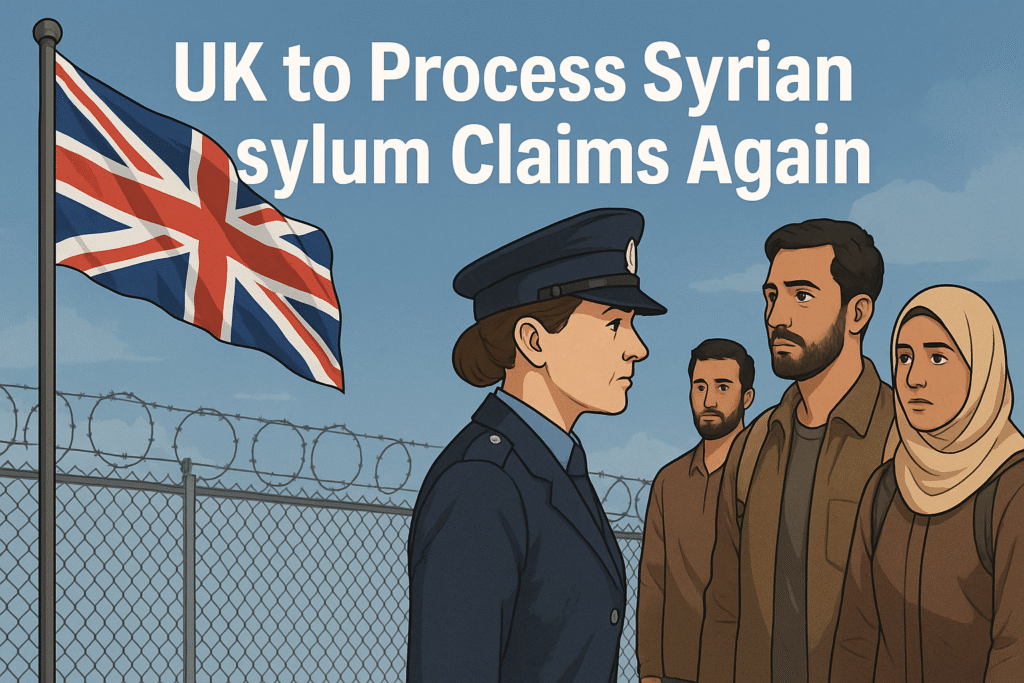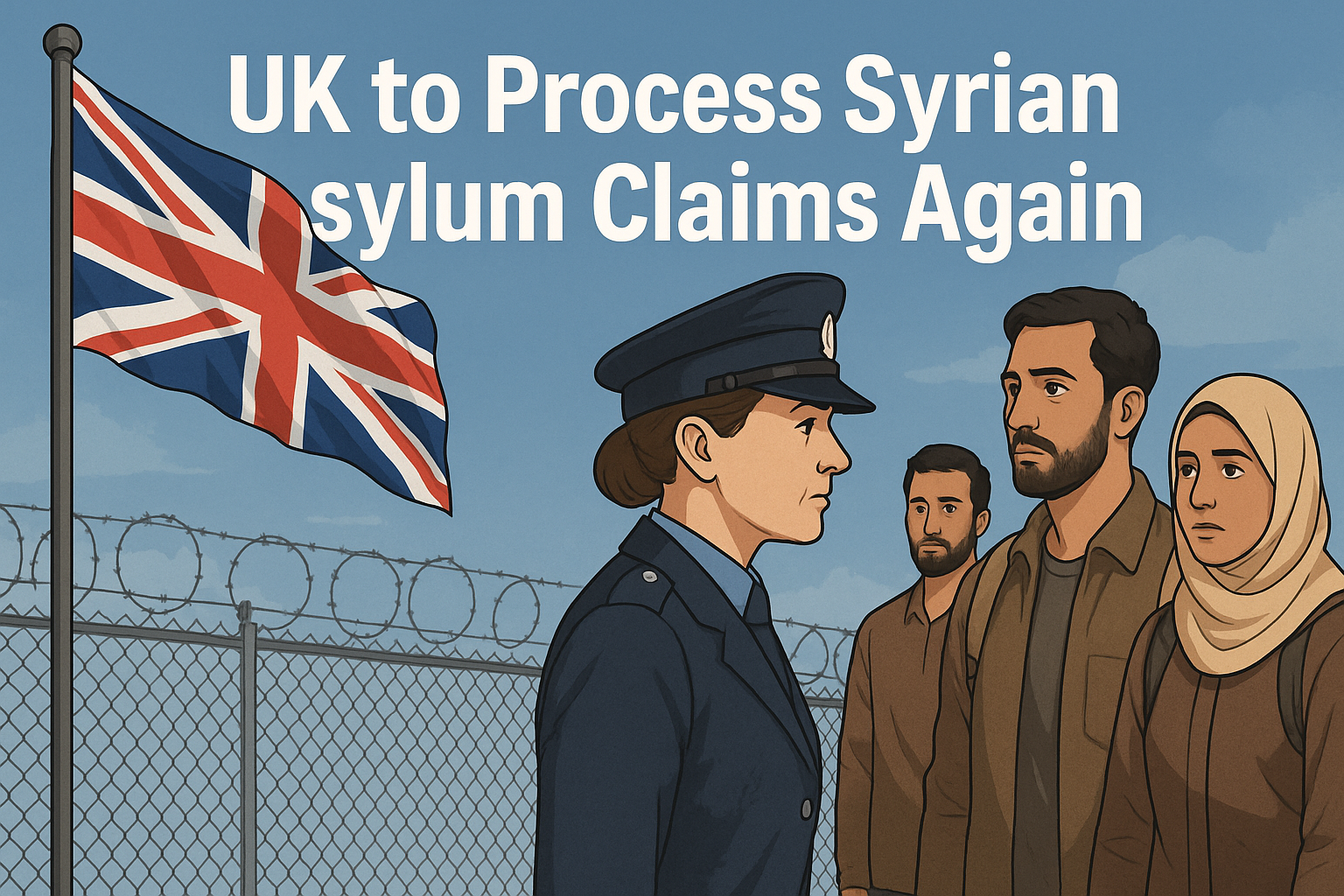In a major development for refugee rights and immigration policy, the United Kingdom has announced it will begin processing Syrian asylum claims again. This decision comes more than seven months after decisions on such cases were put on hold following the dramatic collapse of President Bashar al-Assad’s regime. The move marks a significant turning point in how the UK will handle asylum applications from Syrians, many of whom have been left in legal limbo and uncertain living conditions during the pause.
Why the UK Paused Syrian Asylum Claims
The UK government made the decision to suspend processing Syrian asylum claims again in December after a rebel offensive led by the Islamist militant group Hayat Tahrir al-Sham (HTS) overthrew Assad’s government. The fall of the regime created a rapidly shifting political and security environment in Syria, making it difficult for UK authorities to determine the safety of individuals returning to the country or the legitimacy of ongoing asylum applications.
Asylum minister Dame Angela Eagle explained that the Home Office needed to gather stable, objective, and well-evidenced information before making any determinations. She added that officials have “worked to lift the pause as soon as there was sufficient information to make accurate and well-evidenced determinations.” Now, with updated country guidance in place, the UK is ready to begin addressing Syrian asylum claims again.
The Impact of the Pause
The temporary suspension left over 7,000 Syrian nationals waiting for decisions on their asylum applications. Many were housed in government-funded accommodations, including hotels, and faced significant challenges in rebuilding their lives. Without the security of refugee status or permanent settlement, they struggled to access employment, secure housing, or fully integrate into society.
Campaigners had long urged the government to resolve the situation, arguing that leaving vulnerable people in limbo was cruel and counterproductive. Enver Solomon, chief executive of the Refugee Council charity, welcomed the decision to start processing Syrian asylum claims again, stating, “We know the pause in decision making had left Syrian people trapped in further limbo, unable to work, move on with their lives, and fearing for their future.”
Updated Guidance for Decision-Makers
To ensure accurate and fair assessments, the Home Office has published updated guidance for officials tasked with considering Syrian asylum claims again. The new guidelines emphasize that while Syria remains unstable, not every individual will face a well-founded fear of persecution under the new government led by interim president Ahmad al-Sharaa, a figure closely associated with HTS.
According to the guidance, a breakdown in law and order or general instability does not automatically amount to grounds for asylum. Instead, each case will be judged on its individual merits, with claimants required to provide evidence demonstrating they face a real risk of persecution or serious harm.
The government’s updated risk assessment, carried out jointly by the Home Office and the Foreign Office, evaluated the security situation in Syria and established criteria for considering Syrian asylum claims again. This includes assessing the safety of return for religious minorities, political dissidents, and other vulnerable groups.
Who Is Still at Risk?
Although the UK is ready to process Syrian asylum claims again, the updated guidance acknowledges that certain groups remain at heightened risk. Alawites, an ethnic and religious minority who largely supported the former Assad regime, are considered likely to face persecution or harm under the new HTS-led government. Similarly, Kurds living in areas controlled by the Turkish-backed Syrian National Army may be at risk based on their ethnicity or perceived political views.
On the other hand, the guidance states that groups like Christians, Druze, and Shia Muslims are “unlikely to face a real risk of persecution or serious harm from the state.” However, each application will still be evaluated on a case-by-case basis, and the burden remains on the applicant to prove their individual risk.
Enforced and Voluntary Returns to Syria
In recent months, the UK has witnessed a slow trickle of voluntary returns to Syria. BBC News reports that over 20 Syrians have already chosen to return this year, even before the government’s decision to start processing Syrian asylum claims again. Now, ministers hope to conduct the first enforced returns before the end of the year.
A senior Home Office source stated that enforced returns “wouldn’t say it’s a million miles away,” indicating that deportations could begin relatively soon. This has sparked concerns among human rights groups, who argue that Syria remains unsafe for many and that forced removals should be approached with extreme caution.
International and European Context
The UK’s decision to process Syrian asylum claims again comes as several European countries reconsider their own policies on Syrian refugees. Austria, for instance, recently became the first EU nation to deport a Syrian national since Assad’s fall. Some British officials expressed concerns that the UK might become a more attractive destination for Syrian asylum seekers if it maintained a more lenient policy while other European states began returns.
French President Emmanuel Macron also raised concerns about the “pull factors” that might draw asylum seekers to the UK, particularly those making dangerous Channel crossings in small boats. The UK’s move to begin addressing Syrian asylum claims again could reduce these perceived pull factors while bringing its asylum policy in line with shifting European attitudes.
Diplomatic Moves and Sanctions
Another factor influencing the decision to process Syrian asylum claims again was the gradual normalization of diplomatic relations between the UK and Syria. Earlier this month, Foreign Secretary David Lammy became the first British minister to visit Syria since the 2011 uprising. During his visit, he met interim president al-Sharaa to discuss regional security, humanitarian issues, and the future of bilateral relations.
This thawing of diplomatic ties has made it possible for the UK to conduct risk assessments and update its country guidance more effectively. Additionally, the British government has started lifting some of its economic sanctions on Syria, creating an environment where processing Syrian asylum claims again became administratively and politically feasible.
Humanitarian Concerns and Future Outlook
While the Home Office insists that each application will be thoroughly reviewed and that no one will be returned to Syria unless it’s deemed safe, humanitarian organizations remain wary. The Refugee Council, Human Rights Watch, and Amnesty International have urged the government to exercise caution and prioritize individual safety.
They argue that despite changes in leadership, Syria continues to experience significant instability, and many refugees could still face persecution if forcibly returned. These groups have called for the government to handle Syrian asylum claims again with sensitivity, ensuring that every claim is assessed on a personal, evidence-based basis.
Conclusion
The UK’s decision to process Syrian asylum claims again is a landmark development in its immigration policy, bringing relief to thousands of Syrian nationals awaiting decisions. With updated risk assessments, revised country guidance, and new diplomatic channels in place, the Home Office believes it can now make fair and well-informed decisions.
However, the situation remains delicate, and human rights advocates stress the need for careful, compassionate handling of each case. As the UK moves to balance border control with humanitarian obligations, the way it processes Syrian asylum claims again will be closely watched both at home and abroad.

